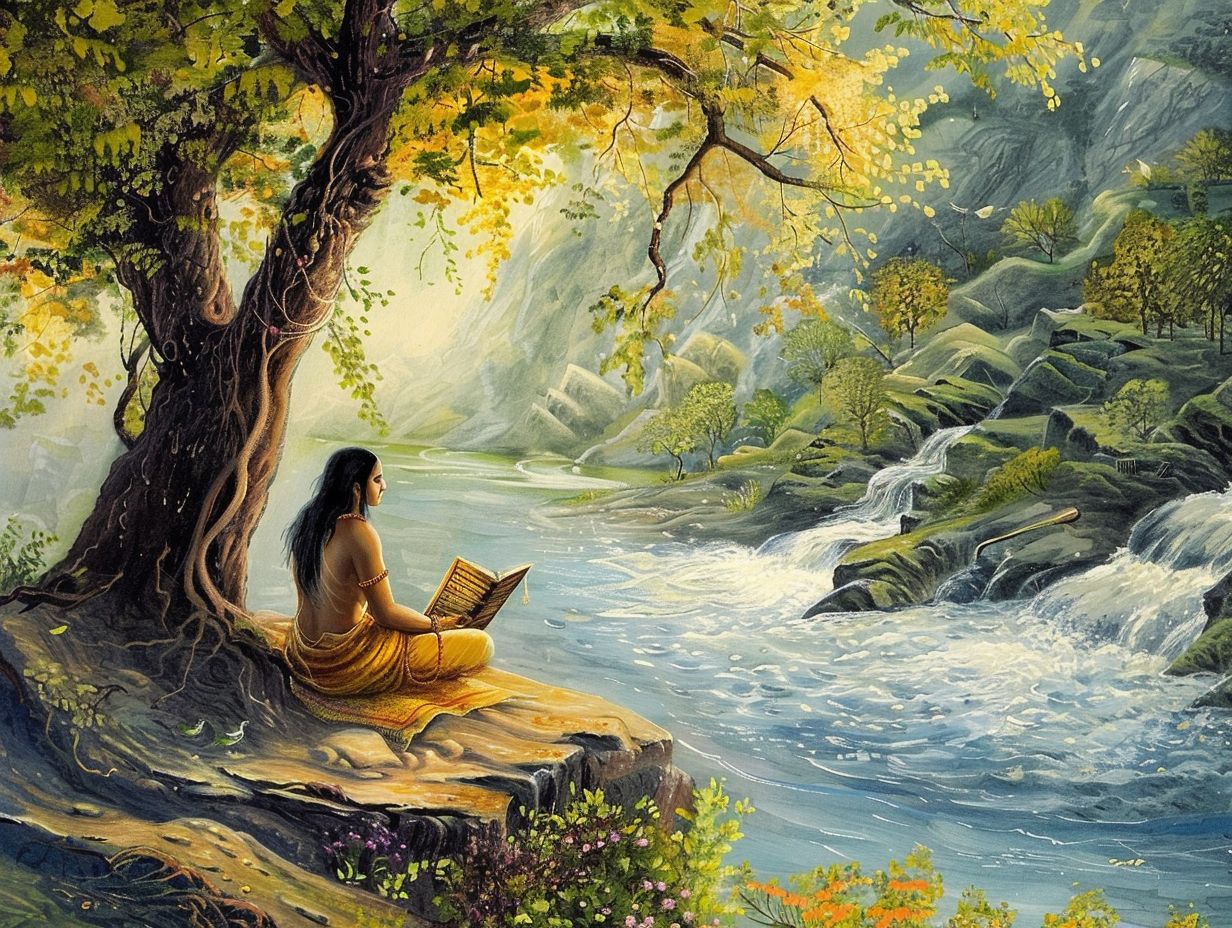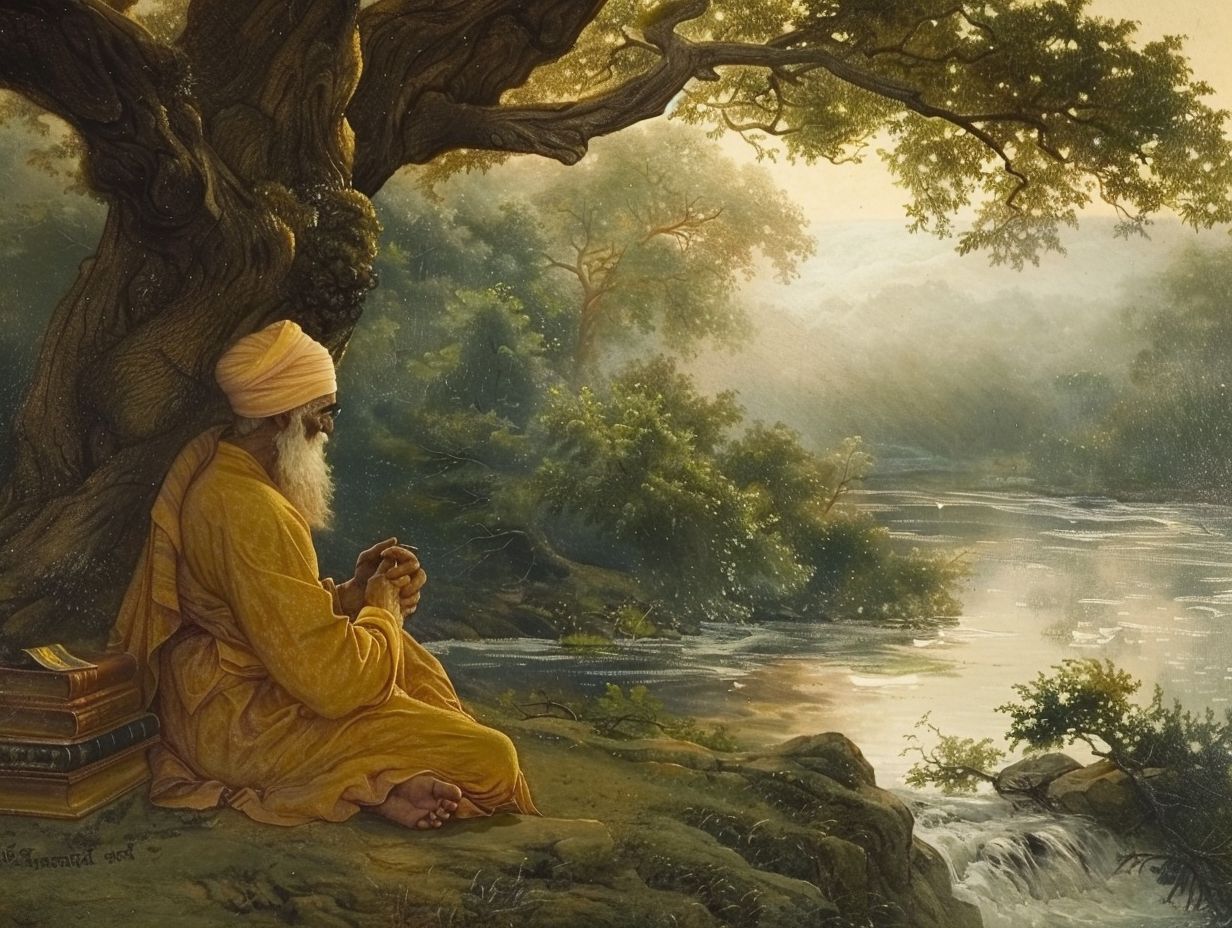Contributions of Badarayana to Vedanta
Badarayana, a pivotal figure in Indian philosophy, stands out for his foundational contributions to Vedanta, a significant school of thought within Hinduism.
This exploration delves into the essence of Vedanta, examining its various schools and the profound impact of Badarayana s work, notably his authorship of the Brahma Sutras and the systematization of Vedantic philosophy.
It reveals how his insights have shaped Hindu theology and philosophy, highlighting their relevance in contemporary discourse and illustrating how his teachings can be applied for personal growth and deeper understanding.
Who is Badarayana?

Badarayana, a revered figure in ancient Indian philosophy, is celebrated primarily for his foundational contributions to the Vedantic tradition, notably through the authorship of the Brahma Sutras. His teachings draw deeply from the profound wisdom encapsulated in the Upanishads, which investigate the essence of ultimate reality and consciousness.
Badarayana’s philosophical explorations encompass key concepts such as Brahman, Atman, and the complexities of spiritual knowledge, establishing him as a guiding guru whose insights continue to illuminate the journey for seekers of self-realization and liberation.
His influence permeates various Vedantic schools, significantly shaping the discourse surrounding non-dualism and the fundamental nature of existence.
What is Vedanta?
Vedanta, a profound philosophical system grounded in the sacred texts of ancient India, primarily investigates the essence of Brahman and Atman, exploring the intricate relationship between ultimate reality and the self.
This philosophical inquiry embodies essential concepts of non-dualism, wherein the distinction between the individual self and universal consciousness is transcended. As a culmination of the teachings articulated in the Upanishads and Brahma Sutras, Vedanta serves not only as a guide for spiritual awakening but also as a robust framework for addressing metaphysical, epistemological, and ontological inquiries. Its contributions significantly enrich the expansive body of wisdom literature that underpins Hindu philosophy and ethics.
What are the Different Schools of Vedanta?
The multifaceted landscape of Vedanta comprises various schools of thought, each presenting distinct interpretations of the foundational principles steeped in ancient Indian philosophy. Among these, Advaita stands out, advocating for non-dualism, while Dvaita emphasizes a dualistic perspective on the relationship between Brahman and Atman. The Achintya Bheda Abheda school offers a synthesis of these viewpoints, fostering a nuanced understanding that acknowledges the inherent complexity of existence and the divine.
Together, these diverse perspectives enrich the theological discourse within the Vedantic tradition, reflecting its depth and varied approaches to metaphysical inquiries.
Advaita Vedanta, particularly articulated by sage Adi Shankaracharya, posits that ultimate reality is singular and that the individual soul is an illusion born from ignorance. This school asserts that the realization of the oneness between Atman and Brahman is the path to liberation.
Conversely, Dvaita, formulated by Madhvacharya, firmly maintains a distinct separation between the individual soul and the supreme divine, arguing that this duality is essential for comprehending devotion and the nature of reality.
Meanwhile, the Achintya Bheda Abheda perspective, as articulated by Chaitanya Mahaprabhu, posits that while the individual and the divine are distinct, their relationship is both inconceivable and yet undeniably real. This intricate interplay between distinctions transcends mere intellectual debate, profoundly influencing the spiritual practices of adherents, molding how they engage with the divine.
What is Badarayana’s Contribution to Vedanta?
Badarayana’s contributions to Vedanta are nothing short of monumental, primarily defined by his authorship of the Brahma Sutras. This foundational text systematically articulates the philosophy of Vedanta and its core tenets.
Through these sutras, he established the groundwork for further theological discourse while skillfully reconciling various interpretations within the Vedantic schools, thereby fostering unity amid diversity. His elucidations on intricate concepts such as Brahman and Maya, alongside the role of karma in the spiritual journey, offer invaluable clarity and insight.
This guidance assists seekers in navigating the complex pathways of spiritual knowledge and ethical living on their quest for liberation.
1. Authorship of the Brahma Sutras
The authorship of the Brahma Sutras by Badarayana represents a pivotal moment in the history of Vedantic philosophy, cementing his status as a key figure in articulating its foundational principles. This scripture functions as a commentary on the Upanishads, systematically conveying philosophical doctrines that explore the nature of Brahman, Atman, and the pathway to moksha.
Through his precise aphorisms, Badarayana crafted a framework for interpreting the often intricate and abstract concepts embedded within the Upanishadic texts, prompting profound discussions among scholars and practitioners alike. His distinctive synthesis of various schools of thought within Vedic literature not only illuminated core ideas but also established a foundation for future commentaries by prominent thinkers such as Shankara and Ramanuja.
Consequently, the Brahma Sutras became essential for those seeking to grasp the metaphysical underpinnings of existence and the interconnectedness of all life, further entrenching Vedanta as a dominant philosophical tradition in the realm of Indian spirituality.
2. Systematization of Vedanta Philosophy
Badarayana’s systematization of Vedanta philosophy has laid the groundwork for a comprehensive framework that enhances the understanding of its fundamental principles and tenets. His structured approach to philosophical inquiry has paved the way for the exploration of intricate concepts such as non-dualism, dualism, and the essence of spiritual experience.
By meticulously categorizing various schools of thought, he adeptly distinguished between the differing interpretations and practices that emerge from these philosophies. This clear delineation not only assists scholars and practitioners in grasping complex ideas but also fosters further dialogue regarding the implications of concepts like Brahman and Atman.
Consequently, the inquiry into the self and ultimate reality has been significantly enriched, enabling new generations of thinkers to engage with core doctrines while challenging established paradigms. Badarayana’s contributions have thus proven pivotal in shaping the discourse surrounding Vedantic philosophy, fostering a deeper understanding of the intricate relationship between the individual and the universe.
3. Reconciliation of Different Schools of Vedanta

Badarayana’s remarkable capacity to reconcile various schools of Vedanta, particularly Advaita and Dvaita, underscores his deep comprehension of the philosophical discourse within this rich tradition. By engaging with the contrasting perspectives on the nature of reality and the intricate relationship between the self and the divine, he cultivated a dialogue that significantly enriched the Vedantic narrative.
This dialogue provided a critical framework for bridging the divides between diverse interpretations, enabling practitioners to delve into themes such as the oneness of ultimate reality as posited by Advaita philosophy and the dualistic approach highlighted by Dvaita.
Through a meticulous examination of the complex arguments surrounding the nature of Brahman and individual souls, Badarayana not only illuminated the intricacies present within these philosophical schools but also fostered a synthesis of ideas, facilitating a deeper appreciation of Vedantic thought.
His contributions serve as a poignant reminder of the importance of inclusivity in philosophical discussions, ensuring that no perspective is summarily dismissed but rather interpreted through the lens of a collective quest for truth.
4. Clarification of the Concept of Brahman
Badarayana’s profound contributions include a pivotal clarification of the concept of Brahman, which he articulates as the ultimate reality that underlies all existence. His insights have significantly shaped the understanding of Brahman within Vedanta, emphasizing its non-dual nature and underscoring the necessity of self-inquiry for genuine realization.
By defining Brahman as an all-encompassing, formless essence, he offers a framework that invites deep contemplation on the nature of existence itself. This perspective encourages seekers to move beyond dualistic perceptions, fostering an inner journey that unveils the interconnection between the individual self (Atman) and the universal spirit.
The implications of Badarayana’s teachings reach far beyond abstract philosophical discussions; they serve as a guiding light for aspirants in their quest for enlightenment. Within this context, the practice of self-inquiry emerges as an essential endeavor, ultimately leading to the realization that the true nature of the self is, indeed, non-different from the ultimate reality of Brahman.
5. Elaboration of the Concept of Maya
In his works, Badarayana meticulously elaborates on the concept of Maya, often portrayed as the illusion that obscures the true nature of reality. Through a thorough dissection of Maya’s intricacies, he offers profound insights into how this fundamental principle shapes the spiritual journey toward enlightenment and liberation.
This exploration demonstrates that Maya is not merely an impediment but also an essential framework for grasping the duality inherent in human experience. Within the Vedantic context, the recognition of this illusion enables seekers to question apparent realities, thereby nurturing a deeper philosophical inquiry into existence.
As practitioners engage with Badarayana’s interpretation of Maya, they begin to unveil how everyday perceptions can shroud higher truths, ultimately paving the way for a transformative spiritual awakening. This understanding inspires individuals to transcend the superficial layers of life, guiding them along a path toward self-realization and unity with the ultimate reality.
6. Explanation of the Role of Karma in Vedanta
Badarayana offers a profound exploration of the role of Karma within Vedanta, illuminating its significance in both spiritual practice and the ethical conduct of individuals. He underscores that a clear understanding of Karma is crucial for navigating the intricate paths toward liberation and self-realization.
Through his teachings, it becomes evident that every action, whether virtuous or detrimental, plays a vital role in shaping not only one’s current circumstances but also future outcomes in this life and beyond. By fostering an awareness of Karma, practitioners are enableed to align their actions with elevated ethical standards, thereby promoting personal growth and enhancing spiritual insight.
This understanding acts as a guiding principle, urging individuals to engage in intentional and mindful actions. Each choice carries the potential to further entangle them in the cycle of rebirth or to propel them toward the ultimate aspiration of moksha.
In essence, Badarayana s insights invite deep reflection on the moral implications of one s actions, inspiring a commitment to a life rooted in virtue and compassion.
What is the Significance of Badarayana’s Contributions to Vedanta?
The significance of Badarayana’s contributions to Vedanta is immense, as his teachings have profoundly shaped Hindu philosophy and influenced the trajectory of spiritual thought over the centuries.
His insights resonate powerfully in contemporary discussions, providing essential frameworks for exploring the nature of existence, consciousness, and the various paths to liberation.
1. Influence on Hindu Philosophy and Theology
Badarayana’s influence on Hindu philosophy and theology is unmistakable, as his teachings have significantly shaped the core spiritual principles and doctrines of the tradition. His works not only encourage rigorous philosophical inquiry but also foster a deeper understanding of the spiritual teachings that lie at the heart of Hinduism.
This foundational role has resulted in a profound impact on the interpretation of sacred texts, particularly the Upanishads and Brahma Sutras, which explore the essence of reality, consciousness, and the nature of the self. By championing logical reasoning coupled with experiential insight, Badarayana’s philosophy underscores the importance of personal spiritual practice, inviting seekers to engage with pivotal concepts such as Brahman and Atman in a meaningful manner.
His teachings maintain a striking relevance today, as contemporary spiritual practitioners frequently turn to his discourse to navigate their own journeys toward enlightenment and self-realization. In this way, centuries-old wisdom continues to resonate, enriching modern dialogues on spirituality.
2. Influence on Other Philosophies and Religions

The philosophical insights of Badarayana have transcended the boundaries of Hinduism, leaving a significant mark on various other philosophies and religions through comparative philosophy and dialogue. His interpretations of non-dualism and spiritual knowledge resonate with seekers across diverse traditions, fostering a more expansive understanding of ultimate reality.
This profound impact is evident in the dialogues his teachings have inspired between Advaita Vedanta and various schools of Buddhism, particularly regarding the nature of consciousness and the essence of the self. Furthermore, his thoughts align with certain elements of Neoplatonism, where the concept of the One reflects a non-dualistic viewpoint. Such intersections have cultivated a rich tapestry of philosophical exchange, illuminating the shared quest for understanding the divine across multiple spiritual landscapes.
As scholars delve into these connections, they continue to unveil the interconnectedness of human thought, further enriching the discourse within the realm of comparative philosophy.
3. Relevance in Modern Times
In contemporary society, the teachings of Badarayana hold significant relevance, addressing pressing questions related to spiritual knowledge, ethical living, and the pursuit of self-realization. His insights continue to serve as a source of inspiration for those seeking clarity amid the complexities of modern life.
These teachings encourage seekers to engage thoughtfully with the moral dilemmas prevalent in today s world, advocating for a balanced approach that harmonizes personal development with social responsibility. By incorporating Badarayana’s principles into their daily lives, individuals are better equipped to navigate the multifaceted challenges of modern existence ranging from the pervasive influence of technology to the relentless pursuit of material success while remaining anchored in profound values.
This alignment nurtures a comprehensive understanding of spirituality that surpasses mere ritualistic practices. As a result, Badarayana’s concepts resonate deeply with contemporary efforts to establish ethical frameworks in crucial areas such as environmentalism and social justice, underscoring their enduring significance in the quest to cultivate a harmonious society.
How Can We Apply Badarayana’s Teachings in Our Lives?
Applying Badarayana’s teachings presents a profound pathway to self-realization and spiritual growth, guiding individuals on their quests for enlightenment. By embracing principles such as meditation and self-inquiry, seekers can foster a deeper understanding and connection with the ultimate reality.
1. Self-Realization and Spiritual Growth
The pursuit of self-realization stands at the heart of Badarayana’s teachings, underscoring the significance of inner exploration and spiritual growth as vital components on the path to liberation. Through practices such as meditation, individuals are afforded the opportunity to cultivate self-awareness and transcend the limitations imposed by the illusion of Maya.
By engaging in regular meditation, one can create a sanctuary for quiet reflection, allowing thoughts to settle and deeper insights to surface. This journey often incorporates self-inquiry a technique centered on questioning the nature of the self and the essence of reality. Practitioners are encouraged to observe their thoughts and emotions without attachment, fostering a profound understanding of the transient nature of worldly experiences.
The interplay of these methods not only enhances clarity but also propels individuals toward the realization of unity with the ultimate consciousness a significant aspect of Badarayana’s philosophy.
2. Understanding the Nature of Reality
Understanding the nature of reality, as articulated by Badarayana, invites spiritual seekers to engage in profound ontological inquiries that yield significant insights regarding existence and consciousness. His teachings prompt individuals to critically examine their perceptions and acknowledge the intricate interplay between the apparent illusion and the ultimate truth.
By exploring the complex layers of being, practitioners can uncover a more nuanced understanding of their identities in relation to the cosmos. Badarayana’s explorations illuminate a path toward realizing the self’s connection to a greater whole, transcending mere material existence. His philosophical discourse fosters a rich dialogue on spiritual knowledge, urging seekers to differentiate between transient experiences and enduring realities.
This holistic approach not only elevates individuals on their personal journeys but also provides a framework for grappling with complex ontological issues that continue to echo in contemporary philosophical discussions.
3. Living a Life of Dharma
Living a life of Dharma, as articulated by Badarayana, entails aligning one’s actions with ethical principles that foster harmony both within the individual and the larger community. This steadfast commitment to Dharma is essential for meaningful spiritual practice and for making progress along the path to liberation.
Understanding Dharma transcends mere compliance with rules; it embodies a way of being that cultivates mindfulness, compassion, and integrity. By embodying these values, individuals are able to nurture a deeper sense of self-awareness and purpose, enabling them to navigate life’s challenges with both grace and resilience.
Badarayana’s teachings underscore that living in accordance with Dharma not only enhances personal well-being but also contributes significantly to social stability and collective growth. Such alignment acts as a guiding force, assisting practitioners in making moral choices that resonate with their innermost convictions, ultimately leading to a more enriching spiritual journey.
Frequently Asked Questions

What are the main contributions of Badarayana to Vedanta?
Badarayana, also known as Veda-Vyasa, is considered to be the author of the Brahma Sutras, which is one of the foundational texts of Vedanta. His main contribution to Vedanta is the systematization and organization of the teachings found in the Upanishads, Bhagavad Gita, and other Vedic texts.
What is the significance of Badarayana’s Brahma Sutras in Vedanta?
The Brahma Sutras provide a comprehensive and systematic analysis of the Upanishadic teachings, presenting a logical and coherent framework for understanding the nature of reality and the ultimate goal of human life. It is considered to be a fundamental text for all schools of Vedanta.
Did Badarayana introduce any new concepts in his contributions to Vedanta?
While Badarayana’s main contribution was in organizing and systematizing existing teachings, he also introduced some new concepts. One of the most significant is the concept of ‘Brahman’, the ultimate reality that is the basis of all existence according to Vedanta.
What is the role of Badarayana in the development of Vedanta philosophy?
Badarayana’s contributions to Vedanta had a significant impact on the development of the philosophy. His Brahma Sutras provided a solid foundation for further elaboration and interpretation of Vedantic teachings by other scholars and philosophers.
Are Badarayana’s contributions still relevant in modern times?
Absolutely. The concepts and teachings found in Vedanta, as organized and presented by Badarayana, are still studied and practiced by many today. In fact, his Brahma Sutras continue to be a primary source for understanding the philosophical foundations of Hinduism.
Did Badarayana’s contributions to Vedanta have any influence on other philosophical systems?
Yes, Badarayana’s ideas and teachings in Vedanta have had an impact on other philosophical systems, both within and outside of Hinduism. His concept of Brahman has been adopted and adapted by many other schools of thought, and his approach to systematic analysis has also influenced other philosophical traditions.
